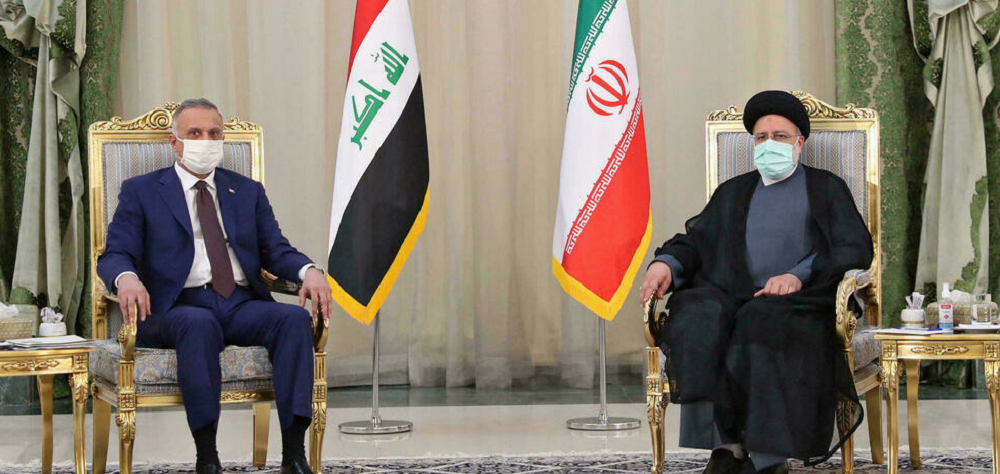Alwaght- Iraqi Prime Minister Mustafa al-Kadhimi arrived in Iran heading a high-ranking political delegation on Sunday.
This was his first visit to Iran since new government took over in Iran. Al-Kadhimi is the first high-ranking foreign guest of the new Iranian President Sayyed Ibrahim Raesi, indicating strategic alliance between Tehran and Baghdad. The PM and other Iraqi officials said the trip was aimed at bilateral relations boost and de-escalation of regional tensions.
Bilateral relations and cooperation boost
Strengthening bilateral ties has been at the center of the two sides' talks as delegations from the two countries exchanged visits over the past years. Their cooperation covers security, politics, and trade.
Expanding security-political cooperation
Like over the past years, this time political and security cooperation was of high-degree focus among the Iranian and Iraqi officials. At present, three issues can be the focus of al-Kadhimi’s talks with Iranian officials. First, the catastrophic US withdrawal from Afghanistan and the Taliban's control of Kabul have prompted rumors in recent weeks that Baghdad could fall in a scenario similar to that in Afghanistan if the US withdraws from Iraq— namely the terrorist group ISIS will be revived and will control various Iraqi cities. In such a situation, Tehran and Baghdad will renegotiate anti-ISIS fight. Actually, al-Kadhimi discusses with the Iranian officials coordination between Baghdad and Tehran for post-withdrawal period.
Second, the two sides will emphasize their strategic alliance after Baghdad conference , held on August 28, and discuss Syria not being invited to meeting that gathered together regional states. The fact is that refraining to invite Damascus led to Tehran discontentment. Al-Kadhimi wants to reiterate Iraq's goodwill for cooperation between Iraq and Syria and explain that the decline to invite the government of President Bashar al-Assad came under pressures from President Emmanuel Macron of France, who was the only Western leader to join the conference.
Third case of discussion is the presence of some anti-Iranian terrorist groups in northern Iraq. In the current situation, Iran wants guarantees from the central government of Iraq and the government of Iraqi Kurdistan in order to control the borders and deal with insecurity in the border areas with Iran. This issue will definitely be discussed during al-Kadhimi’s visit to Iran.
Economic cooperation
The two sides will also discuss expansion of their trade and economic ties. In recent years, the Islamic Republic has targeted $20 billion trade volume with Iraq, and both countries seem to be interested in a higher level. In addition, determining the financial and banking mechanism for repaying Iraq's debts to Iran to continue importing electricity and gas, as well as removing trade and economic barriers, are other important issues that will likely be discussed during al-Kadhimi's visit.
Arabaeen security and number of pilgrims
Security and Arabaeen arrangements are also on al-Kadhimi’s Tehran visit agenda. Due to coronavirus restrictions, Iraqi government last week said it will allow in only 40,000 Muslim world visitors to mark Arabaeen, the annual ceremony held 40 days after Ashura, the 10th day of martyrdom of Imam Hussein, the grandson of Prophet Muhammad. However, Baghdad officials doubled the number just prior to al-Kadhimi visit. In recent days, Iran's Foreign Minister Hossein Amir Abdullah Ian has repeatedly stressed that Tehran seeks to consult with the Iraqi government to increase the number of pilgrims to Arbaeen, with commitment to health protocols due to the pandemic. They also will discuss securing the ceremony, as in recent weeks takfiri groups stepped up their moves in central Iraq.
Mediation between Tehran and Riyadh
Another issue focused by the observers is the Iraqi mediation between the two regional rivals Iran and Saudi Arabia, or even passing a Riyadh message to Tehran by the PM. Iraqi officials more than once reiterated their efforts to mend largely damaged ties between Iran and Saudi Arabia. The two are now engaged in dialogue over a set of regional issues, including Yemen crisis. In recent months, the Saudis, who are apparently losing the Ma'rib battle to the powerful Ansarullah movement of Yemen, have been trying to end the war using Iranian influence via Iraqi mediation. Media reports citing Iraqi government sources say so far four rounds of negotiations have been held between Saudi and Iranian diplomats in Baghdad. Al-Kadhimi seems to eye speeding up the de-escalation.



























